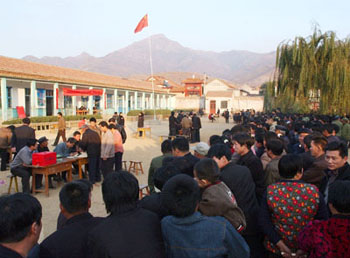Q: It is an undeniable fact that the income of Chinese
farmers has not increased in par with urban people. And the income
gap between rural and urban areas has been widening. What are the
difficulties in increasing farmers' income? What measures
will the government adopt to increase farmers' income, so as to
narrow the gap?
A: Despite the fact that the life of China's farmers has
improved markedly during the past two decades, the gap between the
urban and rural areas is still expanding. Statistics show that in
the seven years from 1997 to 2003, the annual per capita net income
increased by four percent in rural areas, while per capita
disposable income in urban areas was up eight percent. Per capita
income in urban areas is 3.2 times that in rural areas during the
period. Farmers' per capita net income reached 2,936 yuan
(US$354.59) in 2004. However, allowing for price increases, the
real growth rate was only 6.8 percent.
China has more than 800 million farmers. Low agricultural
production returns and low education level farmers, especially
those in grain-producing areas and poverty-stricken areas, have
limited means to increase income. It is even more difficult to
raise their income to the level of urban residents in a short
time.
Since 2004, however, the central government has taken a series
of measures to solve the problem.
First, further tapping agricultural production potentials through
structural readjustment.
Second, making more employment opportunities available to
farmers by promoting township and private enterprises.
Third, providing vocational training and public services for
farmers employed in cities and shouldering their management
cost.
Fourth, providing more State budgetary support for agriculture and
rural development and encouraging the industrial sector to aid the
agricultural sector and cities support rural areas. At the same
time, the central government is drastically reducing the rate of
agricultural tax with the aim to exempt farmers of all agricultural
taxes within five years.

Farmers working in other places came
back to their home villages in Zouping County, Shandong Province,
to cast their ballots during villagers' committee elections in
2004. The turnout was 98 percent.